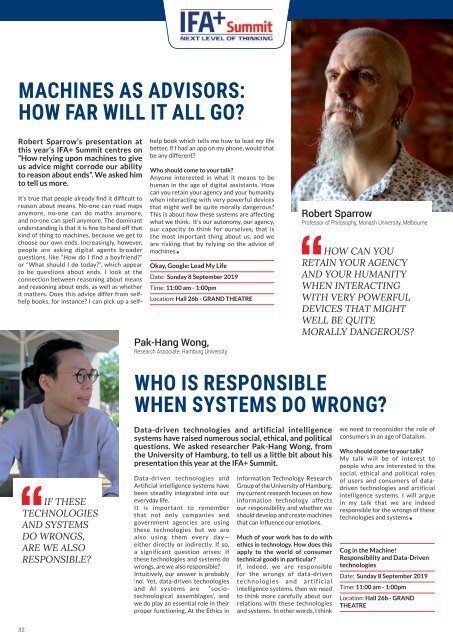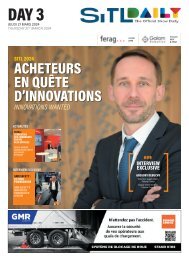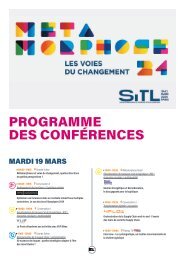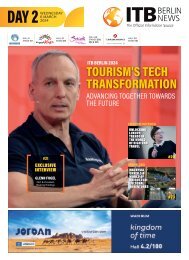You also want an ePaper? Increase the reach of your titles
YUMPU automatically turns print PDFs into web optimized ePapers that Google loves.
MACHINES AS ADVISORS:<br />
HOW FAR WILL IT ALL GO?<br />
Robert Sparrow’s presentation at<br />
this year’s <strong>IFA</strong>+ Summit centres on<br />
“How relying upon machines to give<br />
us advice might corrode our ability<br />
to reason about ends”. We asked him<br />
to tell us more.<br />
It’s true that people already find it difficult to<br />
reason about means. No-one can read maps<br />
anymore, no-one can do maths anymore,<br />
and no-one can spell anymore. The dominant<br />
understanding is that it is fine to hand off that<br />
kind of thing to machines, because we get to<br />
choose our own ends. Increasingly, however,<br />
people are asking digital agents broader<br />
questions, like “How do I find a boyfriend?”<br />
or “What should I do today?”, which appear<br />
to be questions about ends. I look at the<br />
connection between reasoning about means<br />
and reasoning about ends, as well as whether<br />
it matters. Does this advice differ from selfhelp<br />
books, for instance? I can pick up a selfhelp<br />
book which tells me how to lead my life<br />
better. If I had an app on my phone, would that<br />
be any different?<br />
Who should come to your talk?<br />
Anyone interested in what it means to be<br />
human in the age of digital assistants. How<br />
can you retain your agency and your humanity<br />
when interacting with very powerful devices<br />
that might well be quite morally dangerous?<br />
This is about how these systems are affecting<br />
what we think. It’s our autonomy, our agency,<br />
our capacity to think for ourselves, that is<br />
the most important thing about us, and we<br />
are risking that by relying on the advice of<br />
machines<br />
Okay, Google: Lead My Life<br />
Date: Sunday 8 September <strong>2019</strong><br />
Time: 11:00 am - 1:00pm<br />
Location: Hall 26b - GRAND THEATRE<br />
Pak-Hang Wong,<br />
Research Associate, Hamburg University<br />
Robert Sparrow<br />
Professor of Philosophy, Monash University, Melbourne<br />
HOW CAN YOU<br />
RETAIN YOUR AGENCY<br />
AND YOUR HUMANITY<br />
WHEN INTERACTING<br />
WITH VERY POWERFUL<br />
DEVICES THAT MIGHT<br />
WELL BE QUITE<br />
MORALLY DANGEROUS?<br />
WHO IS RESPONSIBLE<br />
WHEN SYSTEMS DO WRONG?<br />
IF THESE<br />
TECHNOLOGIES<br />
AND SYSTEMS<br />
DO WRONGS,<br />
ARE WE ALSO<br />
RESPONSIBLE?<br />
Data-driven technologies and artificial intelligence<br />
systems have raised numerous social, ethical, and political<br />
questions. We asked researcher Pak-Hang Wong, from<br />
the University of Hamburg, to tell us a little bit about his<br />
presentation this year at the <strong>IFA</strong>+ Summit.<br />
Data-driven technologies and<br />
Artificial intelligence systems have<br />
been steadily integrated into our<br />
everyday life.<br />
It is important to remember<br />
that not only companies and<br />
government agencies are using<br />
these technologies but we are<br />
also using them every day—<br />
either directly or indirectly. If so,<br />
a significant question arises: If<br />
these technologies and systems do<br />
wrongs, are we also responsible?<br />
Intuitively, our answer is probably<br />
‘no’. Yet, data-driven technologies<br />
and AI systems are “sociotechnological<br />
assemblages’, and<br />
we do play an essential role in their<br />
proper functioning. At the Ethics in<br />
Information Technology Research<br />
Group of the University of Hamburg,<br />
my current research focuses on how<br />
information technology affects<br />
our responsibility and whether we<br />
should develop and create machines<br />
that can influence our emotions.<br />
Much of your work has to do with<br />
ethics in technology. How does this<br />
apply to the world of consumer<br />
technical goods in particular?<br />
If, indeed, we are responsible<br />
for the wrongs of data-driven<br />
technologies and artificial<br />
intelligence systems, then we need<br />
to think more carefully about our<br />
relations with these technologies<br />
and systems. In other words, I think<br />
we need to reconsider the role of<br />
consumers in an age of Dataism.<br />
Who should come to your talk?<br />
My talk will be of interest to<br />
people who are interested in the<br />
social, ethical and political roles<br />
of users and consumers of datadriven<br />
technologies and artificial<br />
intelligence systems. I will argue<br />
in my talk that we are indeed<br />
responsible for the wrongs of these<br />
technologies and systems<br />
Cog in the Machine!<br />
Responsibility and Data-Driven<br />
technologies<br />
Date: Sunday 8 September <strong>2019</strong><br />
Time: 11:00 am - 1:00pm<br />
Location: Hall 26b - GRAND<br />
THEATRE<br />
32

















